DECARBONISATION – USING DIGITAL ARTEFACT ‘UOWCAFEAMIGOS’ TO EXPLORE NEW WAYS FOR DIRECT ACTION
Global warming may be the defining issue of our time. The main purpose of this report is to explore practical ways direct action can cut greenhouse gas emissions (GGEs) by engaging with the UOW coffee club digital artefact (DA), UOWCafeAmigos. The focus of this DA is to inform members how they can do their individual parts to help support the cause of preventing global warming.
This report will explore what role direct action can have in decarbonisation by firstly presenting a discussion on the focus of the DA, the coffee industry, and how the DA was engaged with in terms of content creation. This is followed by the methodology used to explore practical ways direct action is being taken, or can be potentially taken by coffee industry stakeholders; and in addition, how I engaged with members to encourage them to take direct action themselves. Finally there is a summary of the trajectory of the DA in terms of content creation and engagement, concluding with a general appraisal of the project.
THE DA FOCUS AND CONTENT CREATION
This DA project was established last year to connect with coffee club members and is regularly updated, so I am able to engage with my audience to keep members informed of club activities and general topics about coffee. The audience for the blogs were subscribers to our website and students following the UOWCafeAmigos Instagram page.
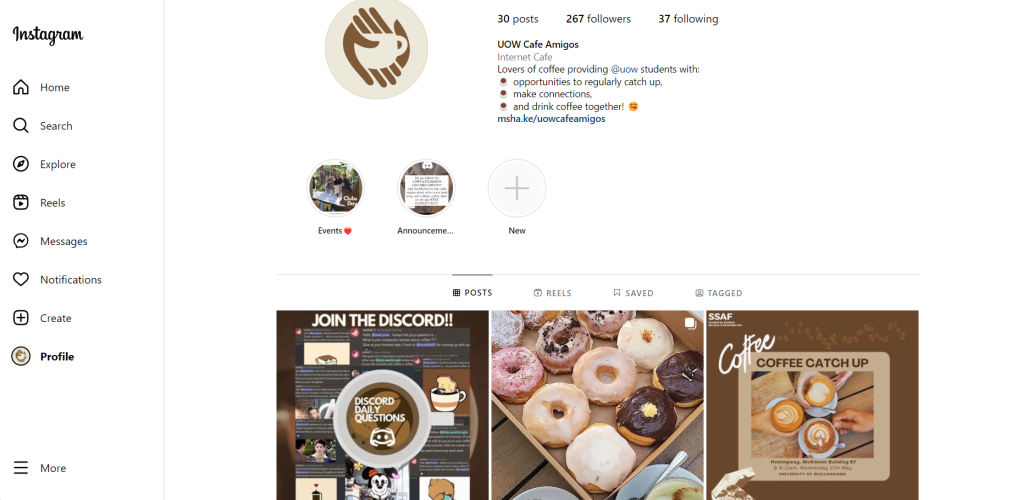
Screenshot of UOWCafeAmigos Instagram page
The ‘We Need To Talk About Coffee’ (WNTTAC) Blog series is a DA that provides weekly blog posts that enables myself and viewers to gather and share information acquired from my BCM325 subject lecture material and my own personal research. It allows us to explore, as a club, how we can take it upon ourselves to implement a positive change and voice increasing concerns directed at global warming. Content curation enveloping Artificial Intelligence in regards to ChatGPT, has assisted in producing strategic ways our club members can engage in such as writing letters or creating petitions, and increasing awareness to members of UOWCoffeeAmigos, other stakeholders in the coffee community and all coffee aficionados.
METHODOLOGY
The first steps taken for this project were moving towards a sustainable approach, where
I would buy and compare the biodegradability of reusable takeaway coffee cups. However, this did not follow through as I was misguided on the DA criteria. However,
I promoted the idea onto our club’s Instagram page to gather analytical data/insights as to
whether they would be interested in the club’s environmental coffee action plan. Additionally,
I promoted a survey on this sustainability approach via the website and Instagram. Unfortunately,
this did not meet the standards of this project’s marking criteria and I had to re-evaluate the next
steps targeting direct action at an industrial/corporate level.
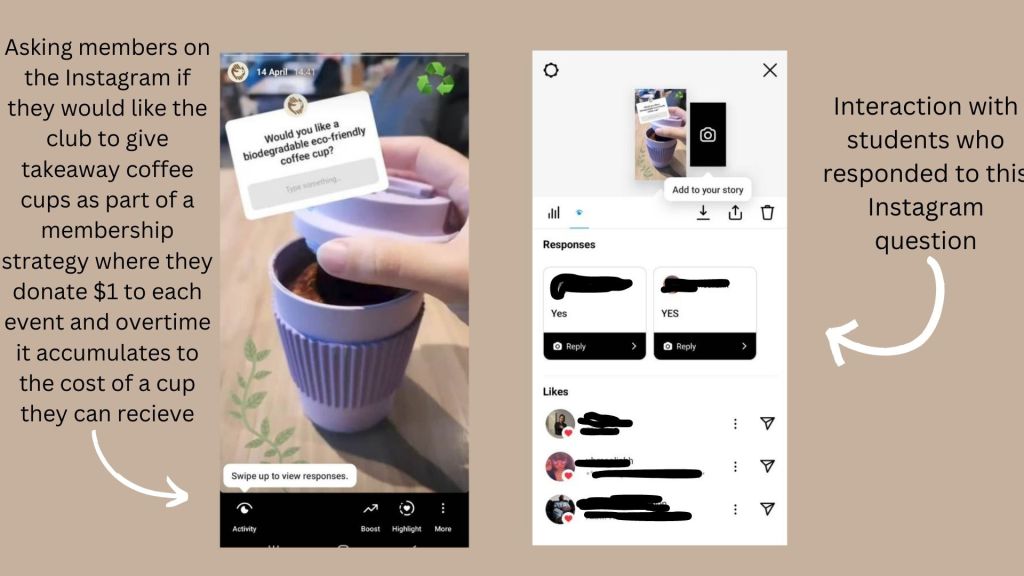
Screenshot of Instagram #1 Stories UOWCafeAmigos
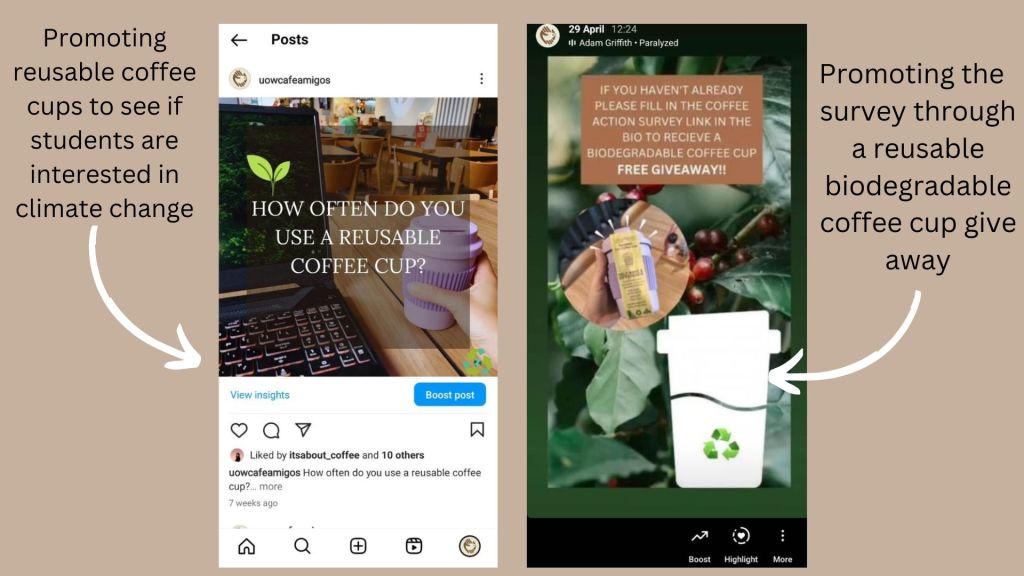
Screenshot of Instagram #2 Stories UOWCafeAmigos
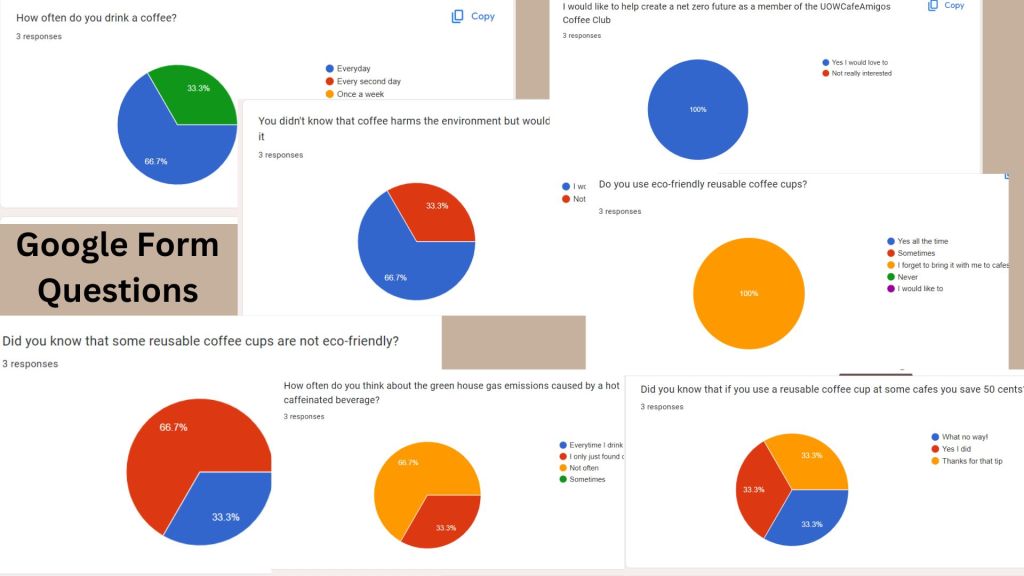
Survey # 1 Methodology: Responses
Each blog post introduces a relevant key concept in the BCM325 Future Cultures weekly material. Potentially, allowing room to share my understanding of the terms discussed in class alluding to future predictions, paradigm shifts and cybernetic perspective systems. The weekly blogs would take a week to generate due to balancing work and other university assignments, therefore, I would upload every Sunday.
Research
The approach of this research was to use this online platform to share ideas and information on decarbonisation and promote direct action. To understand my audience better, I posted a survey on the DA and readers were invited to share their thoughts on a number of issues concerning decarbonising the coffee industry. I was able to use the results to inform my DA on what topics/issues were of interest to my audience. Research readings included academic papers, online journals and newspaper articles.
Analysis
1.Table One: We Need To Talk About Coffee Blog Post Summary
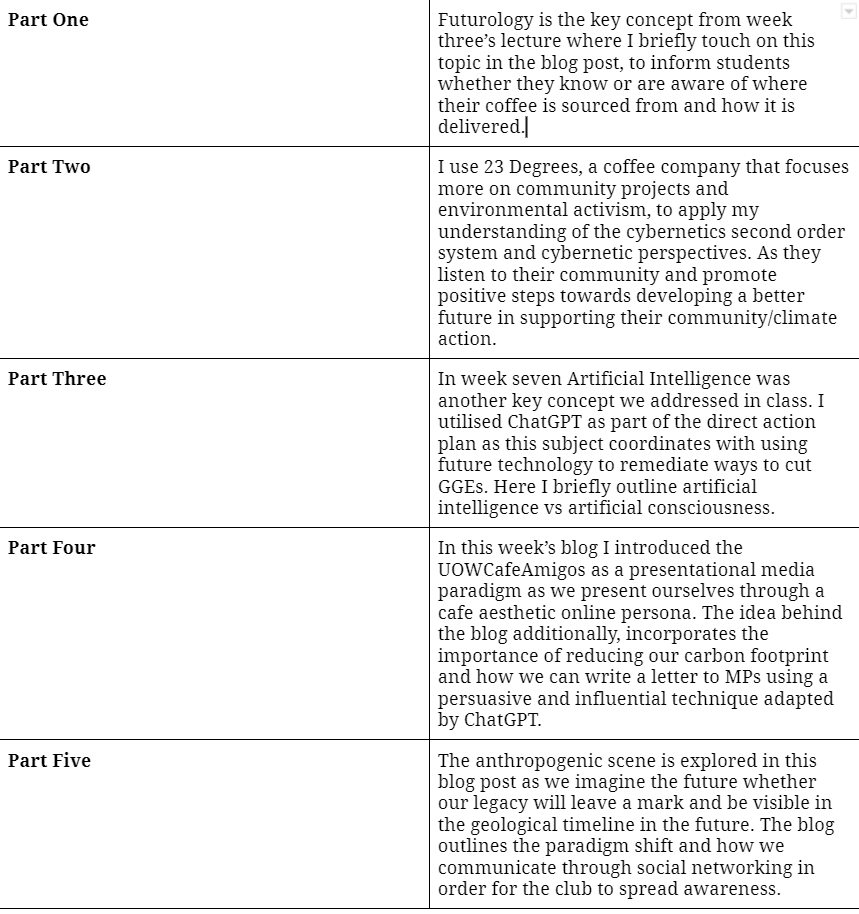
Blog Posts incorporated Artificial Intelligence AI through the use of ChatGPT. I noted that both Part 3, 4 and 5 ChatGPT was useful when structuring helpful and persuasive texts beneficial in the direct action component of this DA. This was part of the future of technology approach for a 2050 net zero future. After analysing how I could have improved my blogs, it would have been preferable if I had more audience engagement/feedback, to determine if the information I have provided is relevant through the iteration and development process of this blog. The Survey # 1 Methodology: Responses graph is an example of how I could have utilised a survey to gather feedback; however, due to time management this was difficult to accomplish.
Action
To encourage members to engage in direct action to cut GGEs, it was important to present information as clearly and accurately as possible. Ways of reducing carbon emissions were introduced via the content on the weekly blogs which included the following actions:
- Research findings were related to the audience via the DA.
- Examples of direct action were suggested from time to time on the blog posts. Those interested were able to get tips on how to write to their MP.
- Coffee outlets on the UOW campus were interviewed on their decarbonisation practises and whether they used certified coffee.
- ChatGPT was used to write social media posts and letters to MPs to remind them that there are many in the electorate that are concerned about this issue. Lobbying is a valuable means to influence and persuade in order to generate change.
Social Utility and Engagement with Public Audience
Social utility of this project relied on the analytical results presented on the WordPress site for UOWCafeAmigos. The data I collected was from viewers’ engagement on the platform and which blog posts had the most engagement.
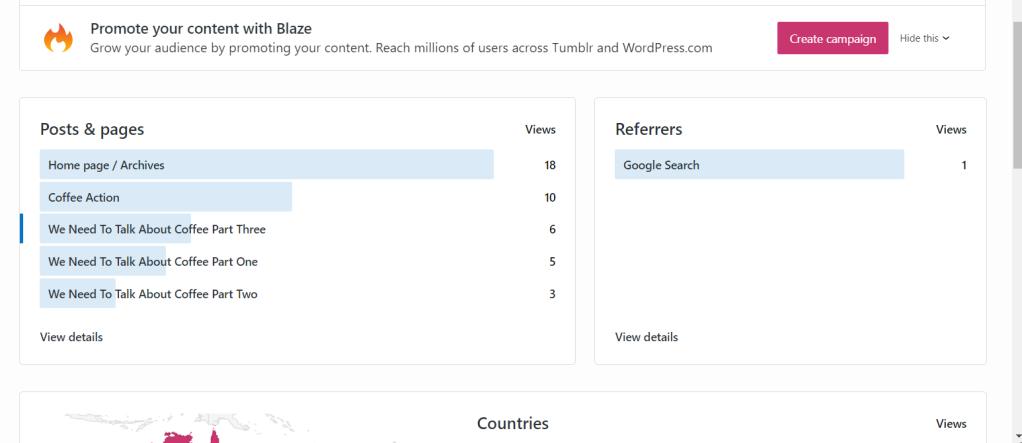
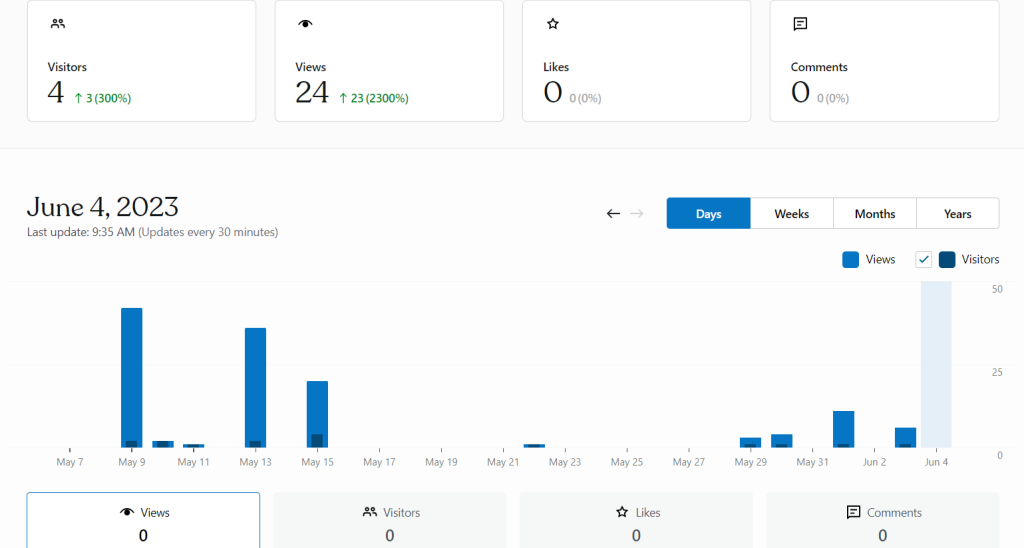
Blog Post Three ‘We Need To Talk About Coffee Part Three’ had the most engagement in comparison to the other blogs which was posted on May 9th. This particular blog post covers artificial intelligence vs artificial consciousness. The website was easy to access as it was linked with the Instagram, Facebook and Discord page for members to read in their own time, feeding member’s curiosity.
Timeline of Progress
In the early stages of this DA project I followed this timeline I designed before receiving helpful/critical feedback. I commenced Week 4, 5 and 6 following this guideline before I was redirected towards a non-sustainability approach, and pushed further towards direct action at industry/corporate level.
Timeline # 1:
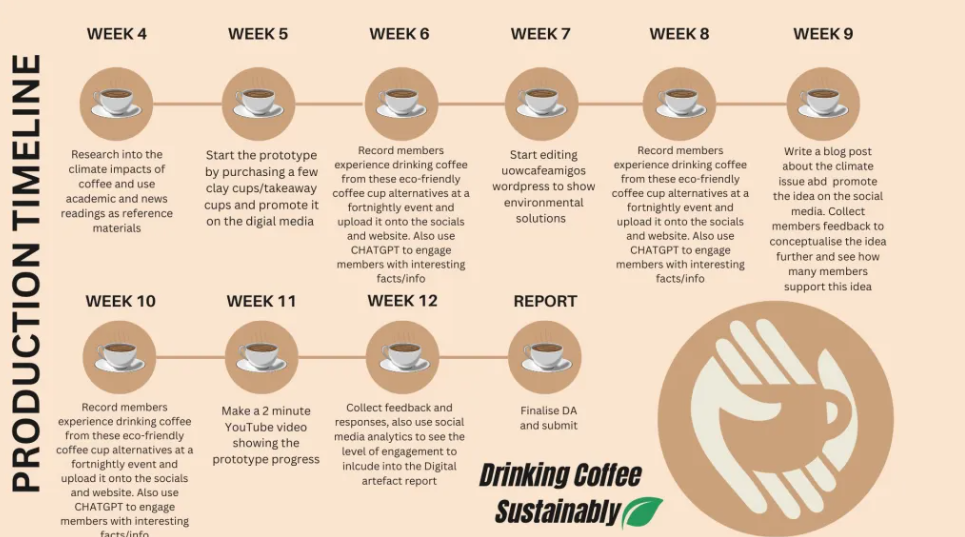
TRAJECTORY
I used a DA that had an already established audience passionate about coffee. I thought I could build on that interest and introduce topics that connect coffee with decarbonisation. My engagement with the DA initially followed a more sustainable approach to cutting GEEs by individual actions, where I promoted the reusable coffee cup idea onto the UowCafeAmigos Instagram page. I became more aware that attempts to reduce carbon emissions via recycling by coffee consumers could only play a minor part in the larger scheme of things concerning decarbonisation. I later refined the DA after helpful feedback from my pitch that shaped the direction the DA was now going to take, and the research was broadened to examine carbon emissions at an industrial level where the majority of GGEs are generated.
PROJECT APPRAISAL
Major setbacks for the trajectory of WNTTAC was the lack of coffee club events which prevented me from implementing planned direct action activities; and also not adequate time to focus on the DA, hence the lack of user engagement/interaction. The survey was adequate at the beginning of the program in getting insight on what the audience knew about the coffee industry and to what extent they were willing to participate in direct action activities.
Decarbonisation is about finding new ways of living (Meza 2022). Changing human behaviour is complicated. The feedback from the social utility of the project from members is that not everyone is comfortable with change or willing to take direct action. In conclusion, this report highlights that there are many ideas for new ways of direct action on cutting GGEs, however, these ideas have to confront the inertia in our systems that resists change (Easterbrook 2016). What will the future present? The challenge that lies ahead is how we can disconnect ourselves from dependence on fossil fuels without society, as we know it, unravelling as a consequence. The actions taken now will shape our future. With each decision made to take direct action to cut GGEs, it brings us closer to finding out whether we can decarbonise our world in time, and avoid the impactful consequences that climate change will bring.
REFERENCES LIST
Ambrose, J 2020, ‘Carbon-neutral coffee comes to UK – via sail boat from Colombia to Cornwall’’, The Guardian, 15 June, viewed 11 April 2023,
https://www.theguardian.com/business/2020/jun/14/carbon-neutral-coffee-comes-to-uk-via-sail-boat-from-colombia-to-cornwall
Balgaranov, D 2022, ‘Galway introduces a borrow system of reusable mugs in the city’s cafes’, The Mayor.EU, 12 April, viewed 28 May 2023,
https://www.themayor.eu/en/a/view/galway-introduces-a-borrow-system-of-reusable-mugs-in-the-city-s-cafes-10262
Broadbent, G & Metternicht, G 2021,’The Australian trucking industry has begun to turn electric’, The Driven, May 6, viewed May 20 2023,
https://thedriven.io/2021/05/06/the-australian-trucking-industry-has-begun-to-turn-electric/
Dudley-Nicholson, J 2023, ‘Woolworths pledges green grocery deliveries by 2030’, The Canberra Times, 1 June, viewed 1 June 2023,
https://www.canberratimes.com.au/story/8218024/woolworths-pledges-green-grocery-deliveries-by-2030/?utm_campaign=Electrify&utm_medium=email&_hsmi=260677338&_hsenc=p2ANqtz-_BLoCVN7ybCLpYm7_ly28DcWG35PHbnRfaB9igGQJGB8wnoHAG-SeO3i6yc1t6IewHVJcVL7iTFxTOYLo3Wck34dB6Lg&utm_content=260677338&utm_source=hs_email
Easterbrook, S 2016,’Inertia on the pathway to decarbonisation’, Serendipity, Weblog post, 21 October, viewed 1 June 2023,
https://www.easterbrook.ca/steve/2016/10/inertia-on-the-pathway-to-decarbonization/
Gould, A 2020, ‘Our single-use coffee cup addiction and how to quit it’, Australian Marine Conservation Society, weblog post, 14 December, viewed 10 April 2023,
https://www.marineconservation.org.au/our-single-use-coffee-cup-addiction-and-how-to-quit-it/
Hill, J 2023, ‘Australia Post debuts new Volvo electric delivery truck’, The Driven, 8 March, viewed May 15 2023,
https://thedriven.io/2023/03/08/australia-post-debuts-new-volvo-electric-delivery-truck/
Mackintosh, A 2022, ‘Australia-first grain ship to test biofuel’s economic and green credentials’, ABC News, 8 January, viewed 25 April 2023,
https://www.abc.net.au/news/rural/2022-01-08/australia-first-biofuel-grain-ship/100745856
Maslin M & Nab, C 2021, ‘Analysis: here’s the carbon cost of your daily coffee – and how to make it climate-friendly’’, UCL, 4 January, viewed 15 April, 2023,
https://www.ucl.ac.uk/news/2021/jan/analysis-heres-carbon-cost-your-daily-coffee-and-how-make-it-climate-friendly
Meza, A 2022,’Decarbonization cannot wait’, UN Climate Change, 5 November, viewed 1 June 2023,
https://unfccc.int/news/decarbonization-cannot-wait
Roy, P 2017, ‘Reusable or Disposable. Which coffee cup has a smaller footprint?’’, Anthropocene Magazine, July, viewed 10 April, 2023,
https://www.anthropocenemagazine.org/2017/07/reusable-or-disposable-which-coffee-cup-has-a-smaller-footprint/#:~:text=They%20also%20tended%20to%20use,take%20more%20than%201%2C000%20uses.
Spilman, R 2021,’ Comparing Carbon Footprints — Ships, Planes, Trucks & Germany’, The Old Salt Blog, weblog post, April 27, viewed 12 April 2023 https://www.oldsaltblog.com/2021/04/comparing-carbon-footprints-ships-planes-trucks-germany/
Walter, S 2023,’The Impact of Transportation on Carbon Emissions’, Coffee Annan, May 17, viewed 11 April 2023,
https://www.coffeeannan.com/en-blogs/the-impact-of-transportation-on-carbon-emissions
Wendel, T 2021,’What is the carbon footprint of your cup of coffee?’, 23 Degrees, viewed 12 April 2023,
https://www.23degrees.com.au/blog/carbon-footprint-coffee-supply-chain/